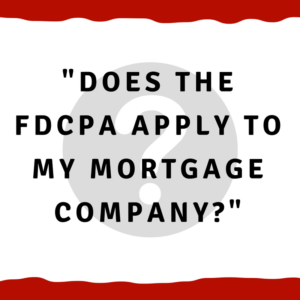Does the FDCPA apply to my mortgage company?
Yes often the FDCPA applies to your mortgage company.
 Here’s a recent question: “I read that the FDCPA, the Fair Debt Collection Practices Act, does not apply to a mortgage company. Is that true?”
Here’s a recent question: “I read that the FDCPA, the Fair Debt Collection Practices Act, does not apply to a mortgage company. Is that true?”
It depends.
Your mortgage company must be a debt collector for the FDCPA to apply and give you protection.
Let’s walk through an example to illustrate this point — if the mortgage company gets the loan and it is not in default, then not a debt collector under the FDCPA. If the mortgage company gets the loan when it is in default, then normally the mortgage company is a debt collector.
Imagine I just got a loan from Wells Fargo yesterday. My first payment is due in 30 days. Is Wells Fargo a debt collector? No, absolutely not a debt collector.
What if they transfer that loan in a week? Remember, my first payment is not due for 30 days. They transfer that loan to Ocwen or Selene Finance or Bank of America or any number of these dozens of servicers we have now. Is that company a debt collector? No because the loan was not in default when the new company received the loan.
What does default mean?
Here’s something ironic. You’ll be six months behind. It gets transferred to Ocwen or to Nationstar. Nationstar does something wrong. You sue them under the FDCPA.
They argue in court, “Wait, wait. We’re not a debt collector. We’re a mortgage company.”
You say, “It was in default.”
They go, “No, no, no, no. You weren’t in default. We have not foreclosed against you.”
So how do we figure out default?
All we have to do is we look at the contract, look at the note, look at the mortgage. It normally says you’re in default if you do not pay on the due date. That’s it.
So let’s say the due date is the 1st of the month and now it’s the 2nd. You haven’t paid. Their own contract says you’re in default.
These abusive mortgage companies go crazy and say, “Wait, wait, wait, wait. Don’t read it that closely. Don’t be precise about it. Come on, everybody knows you’re not really in default until you’re 30 days, 60 days, 120 days.”
What’s funny about that is every other part of the contract they will be so precise, so technical. If you are one day late they’ll charge you a late fee. They don’t say, “Hey, let’s not be technical.”
Let’s take foreclosures. They say, “John, we’re going to foreclose on you on August the 7th.” Okay. “If you don’t pay us $10,000 we’re going to foreclose.” On August the 8th … Just forget that that’s Saturday. August 8th I bring them $10,000. They go, “No, you missed it.”
I say, “Yeah, but it’s one day. Don’t be so precise.”
They go, “Oh, no, no, no, no. Letter of the contract. We’re going to follow this contract exactly to the letter.”
Okay, but you know what? When it says default, you’re in default if you don’t pay on the exact due date.
That’s what it means.
We have all these companies out there that realize they don’t want to be held to the standards of the FDCPA so they argue, “You are not in default. We got the loan on say August the 15th and your due date was August 1st and since you were not 30 days late you are not in default.”
But let’s look at the contract. It says, “One day.” If I don’t pay on the due date, August 1st, it’s in default. Nationstar, you got it on the 15th. You’re a debt collector.
So the mortgage companies say “I hate this. I just hate this law.”
Too bad. 🙂
So the answer to the question, does the FDCPA apply to mortgage companies? Sometimes it does, sometimes it doesn’t. The test is when they got your loan, was it in default? If so, then normally at that point they will be a debt collector.
If you have questions about stopping a foreclosure, I suggest you take our free video course that will train you on how to prevent a foreclosure. If you would rather speak directly with us now, you can call us at 205-879-2447 or contact us through our website.
Best wishes!